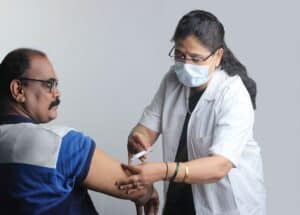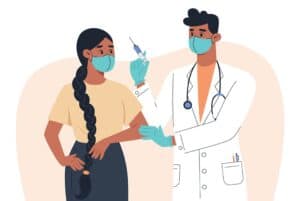
Typhoid fever, also known as enteric fever, is an infection caused by the bacterium Salmonella typhi, and it typically strikes in places with poor sanitation and unhygienic conditions. While typhoid fever symptoms usually include high fevers, headaches, muscle aches and weakness, some other complications may arise that can prove to be fatal for the patient.
Around 20% of typhoid fever cases are fatal, according to the World Health Organization (WHO). Detecting early typhoid fever symptoms can help save your life and keep you from infecting others with this highly contagious disease.
On this page, you will find all the information related to Typhoid fever, such as what are the symptoms of typhoid fever, including causes, diagnosis, treatment and prevention by Internal Medicine Doctor.

The most common symptom of typhoid is a sustained fever that can reach as high as 104°F (40°C). Other signs and symptoms of typhoid fever may include:
Following a week of the incubation period (time between infection and onset of illness), a high fever occurs and is frequently accompanied by abdominal pain. Most infected persons experience only mild or moderate symptoms and may be so ill for as little as 24 hours.
However, 10%-15% of infected individuals become acutely ill, enough to require hospitalization. Typhoid fever can be life-threatening, especially among children under five years old, who are less likely than adults to survive without treatment.
With mild typhoid fever symptoms, you can also experience typhoid without fever symptoms for several weeks or months. In more severe cases, patients may experience delirium or seizures. Typhoid fever usually resolves within 3-6 weeks without complications, but it could lead to intestinal perforation or heart failure if left untreated.
So, once the symptoms start surfacing, it’s important to seek immediate medical care since its complications can be life-threatening.
The cause of typhoid fever is the bacterium Salmonella typhi which typically spreads from person to person through food or water contaminated with faecal matter containing the bacteria.
Typhoid infection cannot be spread by kissing or hugging someone who has been infected. It can spread when an uninfected person ingests foods or drinks handled by a person carrying the disease.
The disease can be fatal in some people with weakened immune systems or who don’t respond well to medication. The most common complication is diarrhea which lasts more than two weeks.

The early symptoms of typhoid fever are most commonly spread when someone ingests food or drinks that have been handled by a person carrying S. Typhi. Transmission usually occurs after ingestion of food or water containing as few as ten colony-forming units (CFU) of S. Typhi, although larger numbers are needed if environmental contamination with faeces is present.
Typhoid bacteria can also live in sewage and survive for up to one week outside a human host in optimal conditions.
A diagnosis of typhoid can be made based on your typhoid fever symptoms and a physical examination. Your doctor may also order blood tests or stool culture. In some cases, a bone marrow biopsy may be necessary. Sometimes, your doctor may also order imaging tests, such as an abdominal CT scan.
If left untreated, the disease can lead to life-threatening complications. Treatment for typhoid includes antibiotics in both pill form and IV form. The antibiotics must continue for three days after the fever subsides in order to prevent a relapse of the infection.
If you think you have typhoid, see your doctor right away. Early diagnosis and treatment are key to a full recovery. Treatment involves taking antibiotics for 7-14 days. Bed rest and fluids are also important. In severe cases, hospitalization may be necessary.
The prognosis of the disease is usually excellent with early diagnosis and treatment.
However, in some people who have weakened immune systems or who don’t respond well to medication, the disease can be fatal. The most common complication is diarrhoea, which lasts more than two weeks.

If you think you or your child has typhoid fever symptoms, see a doctor right away. The earlier the diagnosis, the better. Typhoid fever is not usually fatal if it’s treated early.
The most common form of treatment is antibiotics given by mouth or through an IV in a hospital setting. Typhoid fever can also be treated with antibiotics taken as pills at home.
A person with typhoid fever will feel better within ten days of starting antibiotics, but they should stay in bed until they are no longer sick from their illness because their immune system may still be weak.
At CK Birla hospital, we follow a multispecialty team-based approach to offer our patients premium quality care. Our Department of Internal Medicine is a dedicated department for treating a wide range of infectious diseases. As a NABH accredited hospital, we adhere to international clinical and safety protocols and provide stringent infection control measures.
Our care facility is prominent for employing world-class specialists like Dr Rajeev Gupta, Dr Abhay Ahluwalia, and Dr Kuldeep Grover, who always put their best foot forward in treating the patients. Visit our website to get more information about our services: https://www.ckbhospital.com/